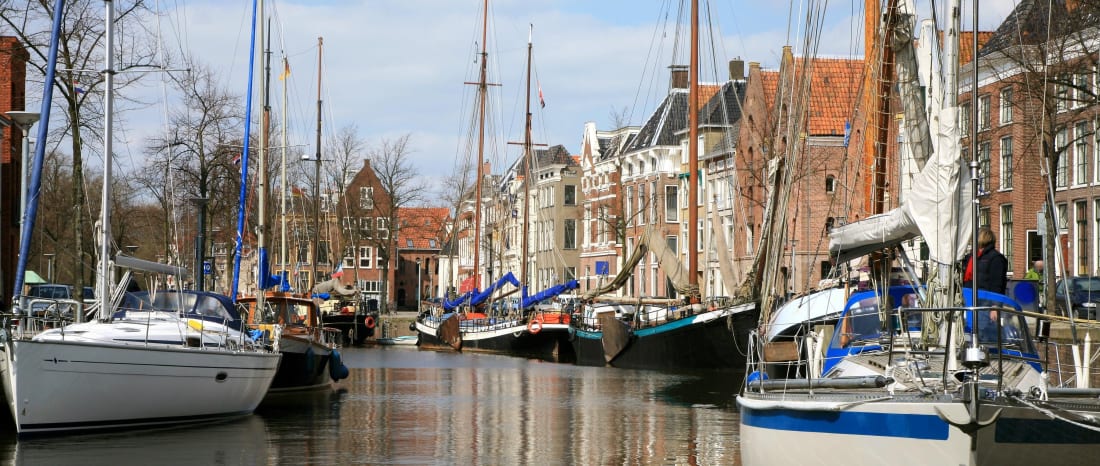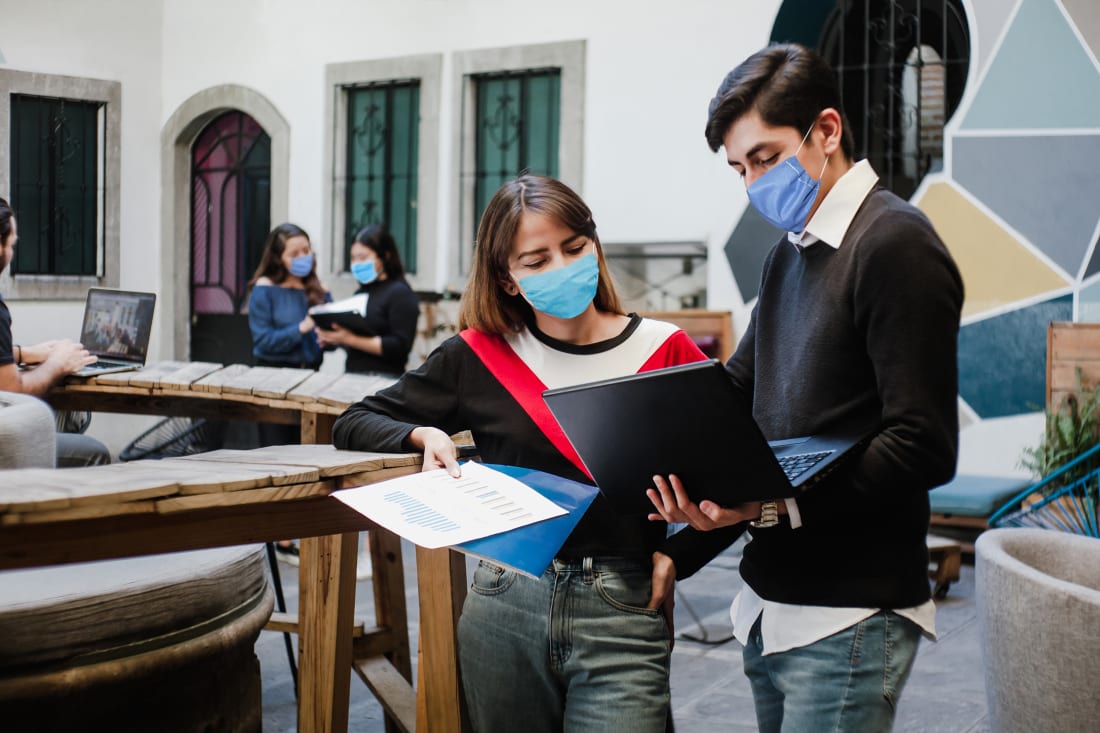Study Master in Netherlands 2024
Study in Netherlands
The Netherlands, located on the coast of the North Sea are part of the great plain of northern and western Europe. The Netherlands has maximum dimensions of 190 by 160 mi (360 by 257 km) and is low and flat with the exception of Limburg in the southeast, where some hills rise up to 322 m (1056 ft). About half the country's area is below sea level, making the famous Dutch dikes a requisite for efficient land use.
The Netherlands is located in northwestern Europe with borders on the North Sea, Belgium, and Germany. In addition to tulips and windmills, the country is famous for its dikes -- about one-fifth of the land in the Netherlands is below sea level and the extensive dike system keeps flooding at bay. The Hague, one of the largest cities in the Netherlands, is host to the International Criminal Court and several other international courts and tribunals. Leading industries include shipping, fishing, trade, and banking. Notable Dutch artists include Vincent van Gogh and M.C. Escher.
Climate
The Netherlands boasts a moderate maritime climate. Summers are relatively cool, with average summer highs around 23 degrees C in August and average winter lows around 0 degrees C in February. Rain can be expected on about half of the days in any given month, and snowfall occurs about 25 days each winter.
Culture
Although Dutch is the official language of the Netherlands, most Dutch citizens speak English. The Dutch are well-known for having an open society that encourages innovation and embraces multiple cultures. In addition, the Netherlands has a very low crime rate.
Cost of Living
The cost of living is relatively low in the Netherlands, compared to many Western European and North American countries. Students will also find a warm welcome and discounts in many restaurants, theaters, and museums. In addition, the Netherlands is extremely bicycle-friendly, and many students will find they have no need to use public transportation.
Change currency
Basic monthly living cost
Rent in a shared flat
634Share of utilities
69Internet subscription
42Local transportation
90
Sample lifestyle cost
Fast food combo
9Cinema ticket
12Pint of local beer
5
About Netherlands
Higher Education
The Netherlands offers bachelor’s, master’s, and PhD degrees. Degrees are offered in two broad categories:
1. Research-oriented programs at research universities. Research universities include institutions
with both general programs and those that specialize in areas such as engineering and agriculture.
2. Professional higher education programs at applied sciences universities.Universities
with applied sciences programs
prepare students to work in specific professions, such as fine arts or education.
All master’s programs require a bachelor’s degree for admission. A bachelor’s degree from a research-oriented program is required for admission to a research-oriented program at the master’s level; however applicants with a bachelor’s degree from an applied sciences program may be admitted if they fulfill additional requirements.
Why Study in the Netherlands?
Studying in the Netherlands provides outstanding value through a combination of low tuition, top-notch universities, and a multicultural lifestyle that embraces international students. In 2012, Dutch universities held 12 of the top 200 positions in the Times Higher Education World University Rankings.
Although students who speak Dutch may prefer to enroll in a program taught in Dutch, many programs in the Netherlands are taught in English. International students are welcome and make up about 13 percent of the students in the country. In addition, some institutions provide programs specifically designed for international students. Any Dutch institution that recruits international students must adhere to a code of conduct that covers counseling and selection of these students. The most popular degree programs for international students are in economics, engineering, the social sciences, and languages.
Universities
The Netherlands has 13 research universities, 39 universities of applied sciences, and 14 other institutions. Three research universities specialize in technology and one research university, Wageningen, specializes in agriculture. Universities receive funding from various sources, including government grants, tuition, fees, and contracts with outside organizations.
Tuition, Program Duration and Academic Year
The tuition for an EU student is about €1,800 to €12,000 per year depending on program type and school. Rates for non-EU students are around €8,000 to €20,000 per year. Although all Dutch master’s degree programs provide excellent value, the Dutch are particularly known for their expertise in Sustainable Energy, Water Management, and Art & Design.
A research-oriented master’s program requires 60-120 credit hours, which takes 1-2 years to complete. Engineering, agriculture, mathematics, and the sciences all require 120 credit-hour/2-year programs. Research degrees are awarded as either a Master of Science or a Master of Arts.
Applied arts and science degrees also require 60-120 credit hours, depending upon the academic discipline. The degree awarded is specific to the academic specialty, such as a Master of Architecture.
One credit hour generally takes 28 hours to complete, and the academic year is 42 weeks long. A full-time student normally completes 60 credit hours in one academic year. The academic year normally consists of two semesters, with the fall semester running from September to January or February and the spring semester running from February through June.
Post-Graduate Opportunities
Upon graduation, all students receive a diploma that indicates their degree as well as a description of the course of study so potential employers in an international student’s home country can understand the degree. In addition, all international students may stay in the Netherlands for up to one year after they graduate to seek employment. There are no restrictions on employment opportunities during that year. Graduates are also encouraged to apply for Ph.D. programs or research positions.
Visa Requirements and Work Permits
EU students do not require a Visa but are required to be registered with the Dutch immigration authorities (IND) by their host institution and to notify their local council. Students from non-EU countries must have a residence permit which is valid for 12 months and can be extended. The student’s host institution should apply for this permit after the student arrives.
Health Insurance
All international students must have some sort of health insurance, which can be provided by their home country. However, anyone who becomes employed in the Netherlands should enroll in Dutch public health insurance. Work permits are not required for students from EU countries, but are required for other international students.
Tips
Top universities in the Netherlands are very competitive, so prospective students should check admission requirements early to make sure they are eligible. English-language programs require students from countries where English is not the native language to demonstrate proficiency through the TOEFL or another accredited English language test.
Visa Requirements
MVV (Provisional Residence Permit) – an entry visa.
VVR (Residence permit) - if you plan to stay in the Netherlands for more than three months, additional to your entry visa, you will also have to apply for Residence Permit (VVR) – an ID card that stands as a study visa.
What type of Visa do you need?
Visa name
MVV (Provisional Residence Permit); VVR (Residence permit)
Price and currency
EUR 311
It currently costs a non-refundable fee of EUR 311 to process an application for an MVV and residence permit for the purpose of studying in the Netherlands. The fees are reviewed twice yearly, and are subject to change mid-year.
Who can apply for the visa?
If you’re a citizen of an EU or EEA member state or Switzerland, you don’t need a student visa or residence permit to stay in the Netherlands.
Non-EU, EEA or Swiss nationals need a residence permit to stay in the Netherlands for more than 90 days – for a shorter period, you only require a tourist visa. There are two documents you need. In most cases, you will need a provisional residence permit (machtiging tot voorlopig verblijf, MVV) to travel to the Netherlands. In addition, you will need a residence permit (VVR) in order to stay in the country.
Citizens of a few countries or people in certain circumstances are exempt from having to apply for a VVR.
You can read more about this here: https://ind.nl/en/mvv-exemptions
Where can you make the application?
education institution
The education institution must apply on your behalf so you need to contact them for details of the procedure. If not, ask for help by contacting the international office (or if you are a researcher, the HR department) of your host institution.
How to make the application?
The visa application procedure is initiated by the university as soon as the student is officially admitted to the study program.
Documents required for the visa application are listed in the letter sent by the university to prospective students. Usually, the following documents are needed:
- a copy of the first page (identity page) of a valid passport;
- proof that you can support yourself financially;
- additional passport-sized photos (size: 35mm x 45mm, see IND requirements in.pdf);
- proof of tuition fees and visa application payments;
- proof of accommodation arranged for at least 1 academic year (10 months);
- for Chinese students, a NESO certificate may be necessary.
Valid proof of a candidate’s financial self-sufficiency can be demonstrated as follows:
- A letter from the host Dutch institution that mentions your internship fee or trainee stipend.
- An admission letter from the Dutch university providing details of your student grant, tuition waiver, or scholarship.
- Your bank account statement with an international bank, indicating enough funds to pay for your proposed expenses in The Netherlands.
When should you apply?
The processing time for your student visa application to the Netherlands is usually one month, although sometimes it can take up to 3 months.
The residence permit is issued for the duration of a student’s study program plus 3 months, up to a maximum of 5 years. If the student wishes to complete a preparatory course, its duration will be added to the visa duration. If the length of the education will take more than 5 years, the residence permit can be extended by one additional year.
There is another condition attached to the validity of VVR. It stays valid provided the student scores 50% of credit throughout the course duration.
Graduates of higher education or university studies (bachelor's, master's, or Ph.D. degrees) can apply for an orientation year for graduates' permit within three years of graduating. This gives you one year to look for employment, during which time you can work without any restrictions or the need for an employer to hold a work permit for you.
Processing time
1 Month
Work opportunities
All international students are permitted to work alongside their studies.
For non-EU and non-EEA students, a work permit is required to work. This permit has to be obtained by the prospective employer on your behalf. Even with this work permit, students can work only for a limited number of hours, i.e. 10 hours a week. They are allowed to work full-time during the months of June, July, and August.
Students from the EU, EEA (except Croatia), and Switzerland do not require a work permit.
Hours per week
10
Why do you need this type of visa?
Your visa application may be rejected if you are not able to show proof of the required funds, or if you provide incorrect or incomplete documents.
Institutions
- Erasmus School of Health Policy & Management
- Hanze University of Applied Sciences, Groningen
- ArtEZ University of the Arts
- The Euler-Franeker Memorial University
- Saxion University of Applied Sciences
- Vrije Universiteit Amsterdam - School of Business and Economics
- Luiss Business School Amsterdam
- Maastricht University, Faculty of Law
- Wageningen University and Research
- European University of Post-Industrial Cities (UNIC)


